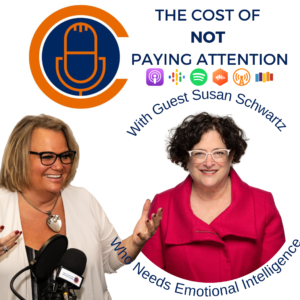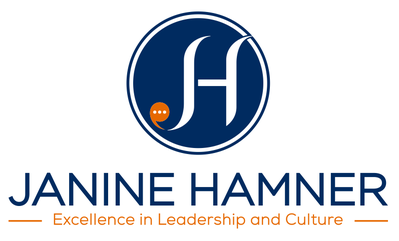
One of the most compelling drivers of successful leadership is one’s ability to manage despite challenges and adversities. It is evident that for someone to be an effective leader, they need to be emotionally intelligent to further provide clarity and motivation to the people within the organization. Join your host Janine Hamner Holman as she talks with Susan Shwartz, MA PMP to discuss their knowledge on being a great leader who empowers others to be at their best and how this can affect the overall performance of the team and the company. Tune in to learn how to pay attention, analyze a situation, make decisions and take control.
HOST: Janine Hamner Holman | [email protected] | LinkedIn, Facebook, and Twitter | Subscribe to my Newsletter! Book me to Speak!
—
Listen to the podcast here:
Emotional Intelligence: Why Businesses Need It To Succeed With Susan Schwartz
What am I paying attention to? How can we come at the same thing from such different perspectives? Sometimes it can be something simple like that proverbial glass of water that has got some liquid in it. Some people see it as half-full. Some people see it as half-empty. Sometimes it’s the lens that we are looking through or the perspective from which we are looking at something.
At the holidays, at our dining room table, we had some candles. My dad took a picture of the candle flame on one of these candles, looking through the goblet like the wine glass part of his wine glass. He took a picture of the flame through the wine glass. It gave it such an interesting look. As we go into this third year of the pandemic, can you all believe it?
It’s all the different ways in which we see things differently. I am being reminded of how sometimes, by shifting our perspective, we can see things anew, which brings me to my guest. I am so thrilled to introduce you to my friend, Susan Schwartz. Susan and I have known each other for a few years. Like many of us in this pandemic, we have never yet met in person. We have developed this real and deep connection through Zoom.
Susan Schwartz is a leadership and management coach. What she does is transform expert professionals into excellent world-class leaders. She takes people who are experts in their field and helps transform them into world-class leaders who are excellent at being world-class leaders. Part of how she does this is she has a super practical viewpoint, which translates intangible leadership skills into tangible action plans that her clients use to build relationships and effectively communicate.
—
Welcome, Susan.
Thank you, Janine. You are one of my most favorite people. I do tend to be an optimist. We would not have had the pleasure of meeting had we not been working remotely and connecting across the brainwave.
When I have no perspective of time and distance, I look back on things in my life that have been the most challenging and the most requiring for me to get out of my comfort zone. Even if it’s hard, difficult, sad or bad, and I look back on them, there’s always something that was an opportunity for growth, development, and learning something new. For me, I have had the opportunity to create so many real friendships through Zoom with people that I would never have met before, like you.
That is a great lead-in to the power of emotional intelligence and why it’s my soapbox. It is my passion that it’s a practical tool. Some of my colleagues, when they talk about emotional intelligence, their methodology is much more a reflective and introspective type of work. My background is in technology.
What does that mean in technology?
People drove business and not technology. Technology is only a tool. Share on XIt means my first job out of college was integrating voice and data systems for AT&T on client sites. At one point, I could count all those bits in a TCP/IP string before cybersecurity became what it did now. I drank the Kool-Aid and believed that technology would drive business. Like every other 27-year-old, after I finished a big project, I deserve that promotion. The promotion that was available was in the training division. I had an affinity for taking the complex and creating something simple out of that so people could understand.
When it was time to leave AT&T, I went to work for a technology training company that was a startup. We went public, and it was time to move on. I went to work with a global software company that had twenty different training divisions that were all siloed. You imagine the duplication. Whenever some of my predecessors had discussed maybe blending resources or trying to take advantage of economies of scale, everybody’s method was better than everybody else’s.
That’s what happens when we create silos.
At AT&T, I was in the sales and marketing division. That’s where my sales skills are. I have never worked harder in sales than I did with this global software company, which was all internal sales. Internal customers are some of the hardest. What I learned during that experience was incredibly positive. We made great strides. It was a wonderful global experience. I realized in the middle of it all that people drove business and not technology. Technology is only a tool. When my time came to leave the software company, and I started out on my own business, I focused on project management and leadership because that’s where that difference can be made.
We all can get hooked into whatever the thing, gadget or system is of the moment. This is the thing that is going to transform work. Ultimately, what is going to transform work is people, whether we are going to transform it for the good or not so good, all of the things that happen, happen through the people. You had started by talking about emotional intelligence. I want to go back to that.
I had become certified as a project management professional, which is a credential that is very difficult to achieve. I worked with one of the university’s adult education programs to help people learn how to pass the exam and become excellent project leaders. Not only would they get hired but they would get promoted and rehired as different government contractors.
My specialty focus was the management and leadership aspect of that track. I would have all of these software programmers and hardware engineers. They would be tough. Most of them were guys but there were some tough women, too. Tough technicians came in, and they were like, “Why do I need to know this garbage? I’m a great coder. I can do this and that.” I would end up doing a sales job after two days. I would always get on the ease up, “This crap isn’t so bad after all. I see why I need it.”
Along this time, I met a lovely woman who introduced me to emotional intelligence. She was pretty insistent that I should consider getting certified. It’s the EQ-i 2.0 assessment. It’s a five-level model. When I went and took the training and started using it, what is so wonderful about this assessment is the report is all color-coded bar charts that technical people can touch and feel. I interpret them using a normal curve. It is all hard data.
To take a step back because I said I was technical, I come from the telecom-IT space. What I have learned is some of the very best clients I’m working with are financial analysts, architects, mechanical engineers and chefs. I started working with a design engineer. They all are very focused. They have spent a lot of time in their fields being experts. That’s why they’ve got promoted. They’ve got promoted because they knew so much.

Emotional Intelligence: Emotional intelligence is about taking a look at what’s going on in the situation and the people and then making a choice on how you want to react to gain the constructive outcome you want to happen.
Nobody considered, “How do they relate to people, build relationships, and have those tough conversations that managers have to have? They may not like people or they want to be everybody’s friend. How can you be the bad manager?” What they end up doing is scaling up. On the East Coast, it’s a very popular term, the Peter Principle, where you fail to the level of your incompetence.
At AT&T, we had a lot of Peters because they played politics. They’ve got to a certain level, and then they didn’t have the people skills to make it work. I met someone who looked at me and said, “You are the anti-Peter Principle.” I was like, “God bless, Peter. He was never trained.” What I have noticed is whether it’s IT, the financial firm or architects, wherever you go, you are promoted because you are very good at your job.
When you are the manager, you don’t necessarily get promoted to become a leader. You grow into being a leader. Very often, some of the strongest leaders in the company are still in the line forces. When the going gets tough, they are going to look at Marge or Marshall and say, “What do you think of this situation?”
Even though they may not be high up in the organization, they have got those skills.
When you start to think about the experts, they are busy people. Nobody can do it better and faster than they can, so they do it themselves. That’s interesting to me that delegation is a common problem across all professions when you are making that jump. If you start to look at what is needed so they can delegate more confidently, you need to trust people and have everybody aligned within the organization. You have to be their coach and guide, not to do it for them but to help them find the areas.
The coolest part about being able to do that is you get to go home at 5:00 because you don’t have to wait until 5:00 to do your job. You can even take a vacation because the work will get done. There are a lot of benefits. Coming back to some of these leadership skills when we think about emotional intelligence, what makes it so tangible for me is that it’s a matter. We talked about paying attention. It’s about observing the situation.
Going back to Marge and Marshall, it’s taking a look at what is going on with the situation and people, and then making a choice how you want to react to gain the constructive outcome that you want to have happened. That’s the key to emotional intelligence. You cannot change anybody else’s behavior but your own. When you think about it, it’s that gut. In your gut, logically, you have those analytical skillsets but something gets you thinking. It’s that gut that you breathe that gets it to your brain. You logically make a decision, and then it goes to your hands for action.
One of the things that I love so much about Susan is we have both been trained in exactly the same rubric of emotional intelligence, EQ-i 2.0. We come at it from different perspectives because we are different people with different backgrounds. That’s one of the things that I enjoy about our conversations and getting to learn one from the other.
When you think about emotional intelligence, I know lots of people. We may have some readers who don’t even know what emotional intelligence is. Some people think emotional intelligence is about being more emotional, which couldn’t be further than the truth of what it is. When somebody says to you, “What is this emotional intelligence stuff,” what do you say?
You cannot change anybody else's behavior but your own. Share on XI say it’s about paying attention and taking control over your life because, as you are paying attention and looking at what is going on, you get to make those choices. You are an active person. Life doesn’t happen to you. Your strength and emotional intelligence help move you forward. What I love best about the rubric that we use, and I will go through the five levels, is that it’s all about engagement.
In school, those of us who are overachievers while recovering now, 94 to 100 was an A. By golly, if I’ve got a 97, I would fight for that 99. I needed those two points. I wasn’t Schwartz back then. Chill out. That 93 was a B-plus. In real life, sometimes B-plus is good enough. When we are looking at that normal curve, and you think about the apex at that top, which is right in the middle of the median, mode or whatever you want to call it, that is 100. When you are 100, you are average. That means 50% of the people are less engaged, and 50% of the people are more engaged. You are not trying to achieve a gold medal.
I read an article in Harvard Business Review where they talked about, “You can have too much emotional intelligence.” They talked about being too empathetic and letting people walk all over you. To me, that’s not emotional intelligence. It’s not like Goldilocks. It’s not too hot or too cold. It’s always right. You are who you are. Sometimes you are engaged. You have certain strengths. We all have areas we are a little more vulnerable. We have a choice. That choice when you take the assessment, you can probably figure it out without even the assessment sometimes.
You could take that gap and get training, a mentor, practice or you could bring somebody onto your team who is good at that. I have a dear friend who is a CPA and Project Manager. She makes spreadsheets thing. I was on the board of our local project management association. I had a membership role. I had twenty different, little subcategories and groups of people. They each had a tiny budget. The key was they didn’t all spend it at the same time. I needed a spreadsheet that showed how much they had when they spent it and how much they had left.
It would have taken me ten hours every month to do this. I could have taken a class. I had an ally. We have known each other since junior high school. I called her. I said, “Do you need professional development units?” Her answer was, “What do you want me to do now?” I told her what I needed. She said, “Do I have to go to any meetings?” I said, “Yes.” She said, “I will do it.” I knew where my shortfall was. I knew what my real mission was. Why don’t I spend time working on the mission and bring somebody onto my team?
That’s exactly where I love that five-level model. First, you start as self-perception. That’s how you view the world, and the world views you. That’s your mission. If you are thinking about it as someone being promoted into management, how do you see your role? What do the people who are promoting you expect you to do? What are the people who used to be your buddies, who now work for you, how do they see your role? That’s where alignment is so neat.
What I like most about emotional intelligence is I have been adapting it for different occupational categories and job roles and exploring how it adapts to each of those levels. You are not trying to fit a circle into a square peg into a circle hole. It’s how you engage and create that abundance. That’s the first level. The second level is self-expression. How do you communicate your message? How do you listen to understand? You are aligning the mission and communication that come out.
You might have somebody good at writing, and they quake when they have to stand up in front of people. You have people who are great extemporaneous speakers, and they write five-paragraph emails that you read three times. You still pick up the phone to call them to find out what they want. That’s because they want you to call them. That leads right into that communication goes into the interpersonal, which is how you execute, how do you bring everybody together to achieve your end goal.
The fourth level is stress management. Bad things happen. The pandemic happened. I learned this, “Be lame when you blame people.” I can’t believe how long I have been doing this. I learned that from one of my students. You have got that, “Holy crap, what is going on?” You have to manage your stress. When bad things happen, everybody looks to the leader to see how they should be reacting. If the leader is jumping ship, they are going to jump, too. You, as the leader, need to recognize how each of your staff handles stress so you can lead and keep them calm.

Emotional Intelligence: Recognizing the strengths of your team members and communicating your trust, admiration, and even gratitude are all emotional intelligence skills.
Bad things happen and they are stressed. Good things happen and they are stressed. Regardless of how things are going, we are going to have stress. How do we manage it?
Once you get it managed, it’s that rolling sea that calms. You have to move forward because, whether it’s good stress or bad stress, your trajectory is going to change. How do you make those decisions on which direction your journey is going to take? There are impulse control, reality testing, and problem-solving skills. I mentioned looking at this from an occupational perspective. Somebody asked me to look at an assessment or report that a C-level person had completed.
They were looking at it. They were very confused because their top three areas were communication-based self-perception. It was all about creating inspirational messages. Their least engaged wasn’t terribly far down on the curve. It was still towards the middle. It was problem-solving, reality testing and managing stress. She didn’t understand it. She thought, as a leader, they should all be over on the fully engaged side.
We were looking at it. I said, “This is a C-level person. I didn’t know anything more than they were a C-level. Their job is to inspire people, be visionary and strategic. Executing may not be their strongest suit but that’s what you do. You bring people onto your team. Do you expect that Chief Marketing Officer to oversee the digital ad campaign?” This is when you are hiring people. It’s how you hire the right people for the right job in these traits.
I was working with a high-performing customer service person and a very high-performing financial analyst who was a total introvert. We expect it. A lot of his communication capabilities were less engaged, and we could work on that. His highest engaged trait was impulse control. For the customer service rep, who is much more people-focused, she was centered around the average part of the curve, and her most engaged trait was also impulse control.
If you think about the financial analyst, you don’t want them jumping to buy anything or recommend something. Money is important, and other people’s money is very important. The customer service rep has to be adept at letting people yell at them and not taking it personally. Isn’t that interesting that two very different jobs and personality types all share the same strength as their number one strength?
Part of what I love about it is when we are thinking about emotional intelligence because they are not the same thing, as well as the soft skills that people need to be able to succeed in this world, there have been so many shifts. It used to be that if I went to see my accountant, I did not expect them to be able to have a super personable conversation with me, get to know me, and understand what I want to create in my life. That wasn’t their function, but now that whole industry is changing. In part, because of the role of AI and automation, so much is becoming written that their job is becoming much more consultative.
It’s a whole industry that needs to develop more emotional intelligence and new soft skills because they are the skills that anyone needs to become a true professional and expert in their arena. It’s the ability to self-reflect, communicate well, make good decisions, and manage stress. It’s all of the things in the pillars of emotional intelligence.
Part of what is fascinating to me is at this moment in time and through the pandemic, and as we are looking at the future of work, there are so many new opportunities to be thinking about the role of the skills in the development of managers, which for a long time wasn’t something that people thought about.
Different people handle stress differently. In stress management, paying attention is so important. Share on XIt has a financial impact also at both ends of the spectrum. When I’ve first got involved, one of my first workshops, I was back on the East Coast Federal Government subcontractor. I had the president of a startup, a government IT subcontracting firm, come to the course. He was very engaged and involved. He was a nice man. I saw him a couple of months later at an industry event and he saw me. He said, “Susan, your course was my favorite course in that whole program.” I was like, “Thank you. I’m not fishing, but could you tell me why?”
What he shared was the workshop was Wednesday and Thursday. He was planning to go on Friday and fire his admin assistant. I was like, “What did she do?” He said, “She wasn’t doing anything illegal or awful. She just didn’t get the urgency. This is a Federal Government IT startup. Everything is urgent.” What he told me is that he learned that different people handle stress differently and that urgency to him meant stress management.
This is where paying attention is so important. He decided he could give her a week. Nothing would happen if he waited one week to fire her. In that week, he started to watch and pay attention. What he realized is when he got the bad news, when bad things happened, his tendency was to wave his arms, shout and slam down the phone. This woman didn’t follow his lead and model his behavior.
What she did is she attuned an amazing admin. She would hear what the challenge was, calmly go back to her desk, figure out who could fix it, and initiate the phone call before he stopped yelling. He would come over and tell her what to do. She was way too polite to say, “I have already done that.” He thought that was not a smart thing to do for your manager. When he realized the value that she brought to the organization, he said, instead of firing her, he gave her a raise.
Part of what I love is that he realized that just because somebody isn’t doing things the way that you would do them or responding in the way that you would respond doesn’t mean that there’s anything wrong with what they are doing. When we can take a minute, breathe, check ourselves, listen, notice, and pay attention, we can then tune into, “Outside of my little fishbowl and panic button, what is going on in the world?”
It’s taking a look through different lenses and perspectives. That’s where I come back. It’s watching behaviors and making choices. It’s watching behaviors because somebody might be different from you are. Just because you have a title doesn’t mean you are perfect. It’s paying attention to what you have control over because if bad things are going to happen and you can’t make some light, then you need to go into the mode of mitigating, “That bad thing has happened. How is it affecting our team? How can our team make the best of this bad situation?”
One of the things that I love about emotional intelligence is that it helps us figure out how to communicate more effectively. One of the things that have been so transformative and that has helped some organizations rise to the challenge in this time is figuring out not necessarily how to overcommunicate but certainly how to communicate differently.
Looking back at March of 2020, organizations were able to say, “This is new. I don’t know about you but I have never lived through a pandemic before. I am not sure what we are going to do about this but we are going to figure it out together. We are all going to be okay.” The organizations whose leadership had both the smarts and humility to say, “Honestly, fuck if I know. I don’t know. I have no idea what we are going to do about this.”
What these leaders did is they said, “I trust you. I know you are confident and can help me.”

Emotional Intelligence: Recognize that you are not the center of your bubble and that, although you have great expertise, perhaps somebody else might have a different perspective that you should listen to understand and not to respond.
“We are going to figure it out together. There are going to be things that I’m going to figure out, and you are going to figure out. There are going to be things that we think we have figured out, and then we are going to realize we were wrong. You, me or all of us, we are going to get through it together.” Learning that vulnerability is a strength. It’s learning that it’s okay to say I don’t know when we don’t know and still communicating, “I’ve got it and we are going to get there together.” It’s continuing to communicate that leadership that people are looking to in times of challenge but doing it with humility and vulnerability. Those are all emotional intelligence skills.
It’s recognizing the strengths of your team members and communicating your trust, admiration, and even gratitude. Somebody said, “They are just doing their job. Why should I thank them?” Thank God they are here doing their jobs.
For many people, the paycheck is important, “I can’t put food on the table and pay my rent without the paycheck. What motivates me to do a good job is feeling connected to the purpose of what we are up to and being seen for the work and contribution that I’m making.” Please appreciate your people.
It comes down to respect because that’s exactly what you were saying. It’s recognizing them, knowing that you appreciate them, and knowing that they are important. I was looking at some statistics for a different project that I’m working on. I thought you would appreciate this. When there’s turnover, people leave companies because they are not respected. They don’t feel valued.
An entry-level person makes more than $8 an hour but in 2021, it was $8 an hour. When that person leaves the company, it would cost $5,500 to replace them. When you think about that, they are $8 an hour. If we go for $15 and double that, it’s going to cost $10,000 to replace a $15-an-hour worker. When you get to that middle level, it’s 150%. If we are looking at senior-level and C-level directors, it’s 400% of their salary to replace them. That’s what turnover costs. That’s the search fees, onboarding, culture, and whatever training you need to have.
You have also lost all of the institutional knowledge that went away with that person. It’s probably even more than 400%.
As you were staffing your organization and modeling emotionally intelligent behavior, you are going to have less turnover. You are going to have more people stay, and you will be known. Your company is going to be a good place to work. In a lot of those good places to work, the stock prices are going up.
There’s a direct relationship between a good place to work with highly emotionally intelligent people, high staff retention, strong mission, vision, and values that play down into the work of every person in the organization, and strong psychological safety. It’s one of my other favorite things to talk about. Those things directly correlate to top-line profits, bottom-line profitability, and stock prices to being able to retain and recruit top talent into your organization. This emotional intelligence stuff matters.
I grew up in the technical IT world. I was one of those people I’m working with. Somebody gave me a bop on the head. When we first hear emotional intelligence, when it first became a thing in the 1990s, we were like, “Emotions don’t belong in the office. You’ve got to hit the ladies’ room before you burst into tears. That was emotion.” When people thought of emotional intelligence, it was woo-woo. It’s a term in the technical geeks’ dictionary. Woo-woo is practical.
People leave companies when they're not respected and don't feel valued. Share on XI did a report a number of years ago. I was looking at all of the different organizations from the Four Seasons Hotel, NFL, Navy SEALs and Southwest Airlines. It’s across many different industries and organizations that are paying attention to emotional intelligence and starting to build this into how their organizations work because they realized it is a big part of what makes organizations work. Susan, this has been great. If you have one, is there one last thing that you would love to leave with people? One last gift or pearl of wisdom that you would love to share?
What sums up our conversation as we were talking about humility and vulnerability is leadership is not a solo sport. You cannot lead a team of one. The first step is you don’t have to take an assessment. It’s always nice to hire a coach. You don’t need to wait for all of this. You can start after we have finished. You can start to practice by paying attention, looking at the world around you, and recognizing that you are not the center of your bubble. Although you have great expertise, perhaps somebody else might have a different viewpoint or perspective that you should listen to.
Listen to understand and not to respond. By listening, you might be right but you will hear where that communication gap is. How you are explaining it, your intention is not being heard by them. Taking that pause, listening, and paying attention to what they are saying in their perspective will help you close that gap and create that truly functional workplace that people enjoy coming to more than 50% of the time.
This is where we spend the majority of our lives in the world of work. My mission is to make the world of work one in which everyone can thrive. Susan, thank you so much for being here with me for the part that you play day-to-day and helping make the world of work one in which people can thrive. Remember, great leaders, make great teams. Until next time.
Important Links:
- Susan Schwartz – LinkedIn
- https://Smile.Amazon.com/Creating-Greater-Whole-Practices-Management/dp/113806405X?sa-no-redirect=1
About Susan Schwartz
 I began my professional career within AT&T’s technical marketing and sales division designing integrated voice and data system. I viewed technology as the significant business driver. After AT&T I joined a technical training start up where I became part of the leadership team that grew the company and took it public. For my next adventure, I worked with a global software company to create a universal learning platform that integrated 20 siloed training organizations. During this time, I realized that technology did not drive business, people drove business. I switched trajectories and began to work in the project management and leadership space.
I began my professional career within AT&T’s technical marketing and sales division designing integrated voice and data system. I viewed technology as the significant business driver. After AT&T I joined a technical training start up where I became part of the leadership team that grew the company and took it public. For my next adventure, I worked with a global software company to create a universal learning platform that integrated 20 siloed training organizations. During this time, I realized that technology did not drive business, people drove business. I switched trajectories and began to work in the project management and leadership space.





Israel Club
March 29, 2022 5:35 amMay I simply say what a relief to uncover somebody that really understands what theyre discussing over the internet. You certainly know how to bring a problem to light and make it important. More and more people really need to check this out and understand this side of the story. I was surprised that youre not more popular because you certainly have the gift.